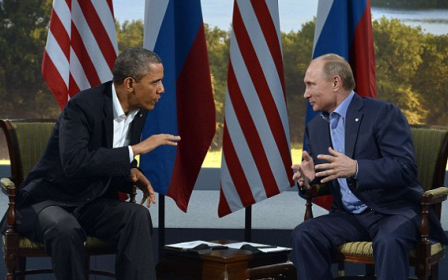ANALYSIS: Russian strikes in Syria again expose US disarray

By Dave Clark
Russia's dramatic entry Wednesday into the Syrian war put the United States on the back foot once again and left Washington struggling to regain the military and diplomatic initiative.
As US Secretary of State John Kerry was in New York trying to coordinate with his Kremlin opposite number Sergei Lavrov, a Russian officer contacted the US embassy in Baghdad.
His message was simple: Russian jets are about to launch air strikes in Syria, please stay out of their way.
Kerry quickly protested to Lavrov that this was not in the spirit of Moscow's promise to agree a "de-confliction" mechanism to ensure Russian flights do not interfere with US-led operations.
But the strikes were already underway, potentially altering the balance of power in Syria back in favour of Bashar al-Assad's government, and Washington was looking at a fait accompli.
Lavrov's next move was to promise to bring a motion before the UN Security Council to coordinate "all forces standing up against Islamic State and other terrorist structures".
This would be a plain victory for Bashar al-Assad, who invited the Russians to join his battle to cling on to power, and a defeat for the US, which has demanded he step down.
The attacks came despite President Barack Obama sitting down with Russia's Vladimir Putin on Monday at the UN for 90 minutes of what both camps called "business-like" talks.
One week ago, Kerry - despite being in frequent contact with Lavrov - told reporters that Russia's deployment of war planes was consistent with their only defending their own base.
And just hours before the strikes began, he appeared on CNN to say that Russia's involvement could be an "opportunity" to persuade them to apply pressure on Assad to moderate his behavior.
After the strikes, Kerry addressed the UN Security Council, but even here his message was mixed.
He said the US would welcome the Russian action if it reflected a "genuine commitment" towards destroying the IS group and not the moderate opposition rebels threatening Assad.
Even as he spoke, a US defense official in Washington briefed journalists that: "We have not seen any strikes against ISIL, what we have seen is strikes against Syrian opposition."
Perils of inaction
The US administration's domestic critics, such as hawkish Senator John McCain, leapt on the apparent confusion.
"This administration has confused our friends, encouraged our enemies, mistaken an excess of caution for prudence and replaced the risks of action with the perils of inaction," he said.
"Into the wreckage of this administration's Middle East policy has now stepped Vladimir Putin."
Frustration is also mounting among Washington's allies in the Middle East, who support moves to defeat the Islamic State group, but also want to see Assad kicked out of office.
Saudi Foreign Minister Adel al-Jubeiri, speaking to journalists in New York on Tuesday, was cautious not to criticise the US alone, bemoaning a "lack of robust action by all of us".
But he was clear on why the Russians had found an opening to insert themselves into the conflict.
"We've called for direct military intervention from day one. We've called for a no-fly zone. We've called for a no-drive zone. We've called for robust arming of the Syrian opposition," he said.
"That's what I mean by 'not enough happened.' That's why four years later we're in the situation we're in," he said.
Speaking privately, diplomats from US-led coalition countries say the Russian "escalation" effectively precludes stronger overt military pressure on Assad, for fear of a clash.
Meanwhile, Arab allies dismiss Moscow's argument that working with Assad is the best way to defeat the Islamic State.
"They're calling for a coalition to fight Daesh, with Iran and Russia and Bashar al-Assad? Without him there would be no Daesh. He created Daesh," Jubeir scoffed, using the Arabic acronym for IS.
Stay informed with MEE's newsletters
Sign up to get the latest alerts, insights and analysis, starting with Turkey Unpacked
Middle East Eye delivers independent and unrivalled coverage and analysis of the Middle East, North Africa and beyond. To learn more about republishing this content and the associated fees, please fill out this form. More about MEE can be found here.




